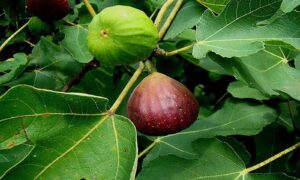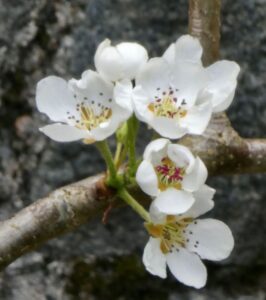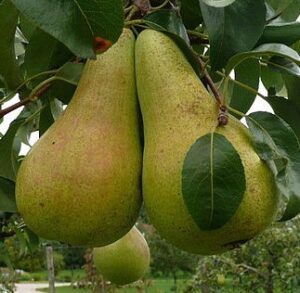THE VICTOR HUGO GARDEN
FIG & PEar
Princes, before God would unmoved see
The blood around your weapons streaming,
The stars will sooner fall like ripe figs
That fall from a wind-shaken fig tree.
‘Dante’s vision‘, XIII, from La Légende des Siècles
”There was a heatwave in Guernsey in 1869, and Victor Hugo was forced by the heat to change his usual writing spot, as he notes in his diary for 7 June: ‘Heat; for the first time since I’ve been in Guernsey I’ve had to work in the morning, not in the lookout (too hot), but in the garden.’ His son Charles had remarked around 1860 that fig trees had been planted in Hauteville House garden against trellises with a view to creating a tunnel; and so it was in this very alley of figs that Hugo wrote his play Torquemada, a drama about the Spanish Inquisition, for which the heat and the scent of figs no doubt provided a favourable atmosphere. But the heatwave set off storms, and when Hugo returned in the autumn from his usual summer trip to the continent, he noted (Saturday 8 November): ‘We got back today at 1.30 in the afternoon, after a rough night crossing in the storm; the alley of figs in my garden, where I wrote Torquemada, has been blown away by the hurricane of the 14 September, and I found nothing left but a few broken fig tree trunks.’
This unfortunate event pushed Victor Hugo to make some changes in the garden. The following February he had the gardeners in to lengthen his lawn, incorporating the spot where the alley of fig trees had been. He used turf brought from L’Ancresse.
(Translated from Gérard Audinet, ‘Victor Hugo’s Garden …, pp. 39-40.)

Figs grow well in Guernsey, so well that they have escaped into the wild and can be found on the cliffs. ‘Brown Turkey’ a hardy and reliable variety, is also known as the ‘Jersey Fig.’ In the Jersey Evening Press of 23 July 2015, we are told: ‘They were common to Jersey farms in the days of outdoor toilets, before mains drains, when effluent was a good fertiliser for a fig tree, the leaves of which also came in useful when the paper ran out’! Figs were part of the abstemious and simple dinner the kindly priest M Myriel shared with Jean Valjean at the beginning of Les Misérables. Again, the fig tree is to be found in the Song of Solomon as part of the mystic garden: ‘The fig tree puts forth her green figs, and the vines with the tender grapes …’


‘Thanks to the railway, Europe will soon be no bigger than was France in the Middle Ages! Thanks to steamships, we can cross the Ocean more easily than once we could cross the Mediterranean! Before long, mankind will circle the globe as the gods of Homer traversed the heavens, in three strides. In a few years, the electric line of concord will encircle the globe and embrace the world.’
Speech to the Peace Congress, 1849.
‘I said to ‘the long golden fruit’ – why, you are nothing more than a pear!’
‘In his poem ‘Answer to an act of accusation’, in Les Contemplations of 1856, Victor Hugo refers to the democritisation of language – in the 18th century poets would use affected style, elaborate phrases to describe something quite ordinary, such as the description of the pear above. However, there is another message here: the pear was the symbol for King Louis-Philippe, a king whose reign, which began liberally and hopefully in 1830, was known as the July Monarchy. His popularity waned as he became more monarchical, however, and he was forced by the French Revolution of 1848 to abdicate. He went into exile in the UK and died in 1850. At the time Victor Hugo had tried to rationalise the king’s fall from grace. Later, a well-known episode in Les Misérables involves a graffiti artist drawing caricatures of Louis-Philippe as a pear and the good-natured king colluding with it. This was based in truth. In order to substantiate an argument in a court case concerning freedom of expression in the press, the artist Honoré Daumier had in 1834 published a caricature known as ‘Les Poires’, in which the king transforms into a pear. This proved so popular that the king became identified with the pear; this undermined his credibility to such an extent that it helped to bring about his abdication. The editor involved in the court case, who had been imprisoned and fined, exulted: ‘Pears were soon to be found all over all the walls in Paris and it spread throughout France.’
In another reference in Les Misérables, the pupils at the convent school, who live on a very spartan diet, secretly eat fallen fruit. Victor Hugo’s partner, Juliette Drouet, was partly the inspiration for the description of life at the convent; it is perhaps not so surprising, then, that she seems to relish her garden in Guernsey and the fruit trees that grew there. As well as a very productive cherry-tree, she grew pears, which were a speciality of the island:
Letter from Juliette Drouet to Victor Hugo, Guernsey 28 October 18[64], Thursday morning, 7 a.m.
‘Good morning! … What a St Martin’s Summer! It seems to me that all the tender moments, all the kisses, and all the ecstasies of our past love are regrowing, greening up and re-flowering in me under this autumn sun like the flowers on the pear trees in my garden.’


